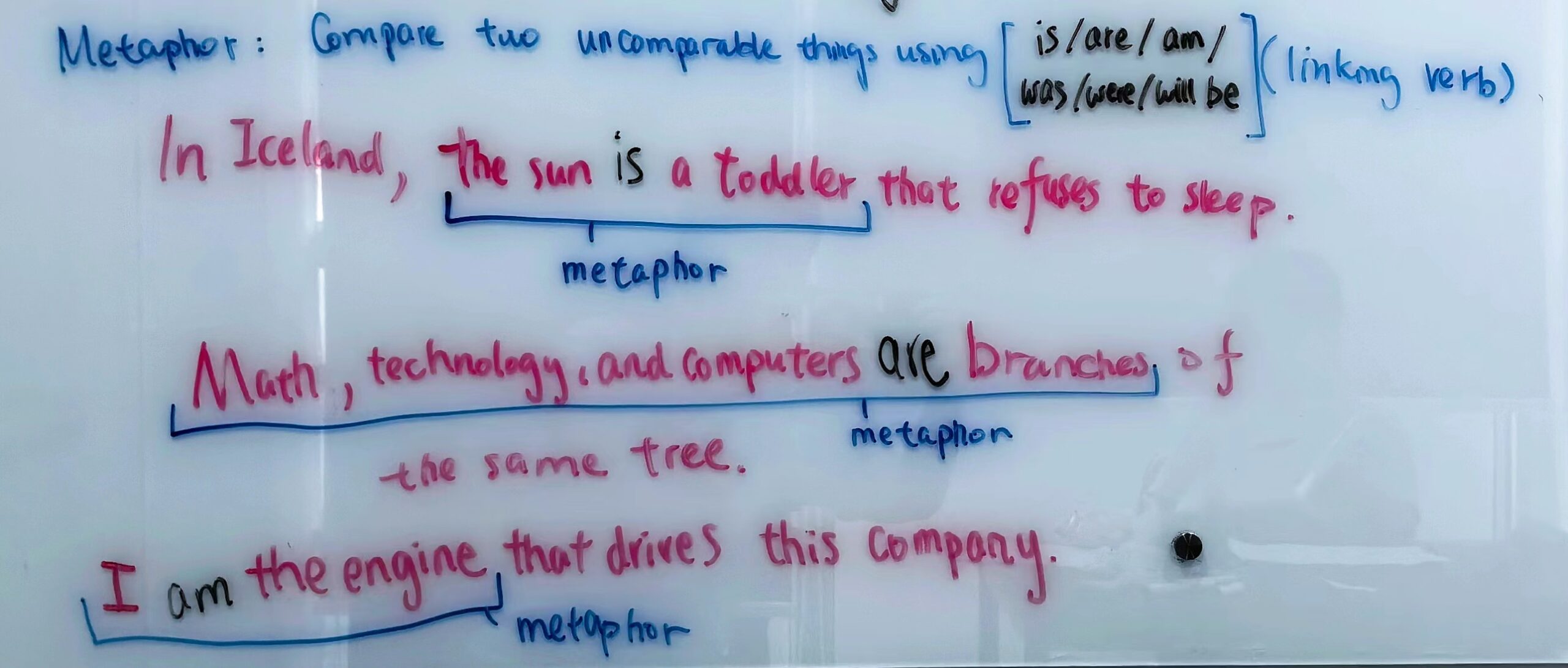How to write a simile
Her eyes are like stars.
When I look at her, they glisten and shine.
I could see my reflection in them, and read her mind.
You wrote the simile, then described it with two adjectives.
In order to satisfy the rthym scheme of the poem, just substitute for another word.
Her eyes are like stars. (A)
They glisten and shine. (B)
I am so glad she is mine. (B)
这个就是用了 simile 去满足 ABB 韵律 的 诗 √
Sample poem with 2 similes
If your teacher wants you to:
Write 3 stanzas of 3 lines poem with two similes:
ABB CDD EFF
Her eyes are like stars. (A) simile
They glisten and shine. (B)
I am so glad she is mine. (B)Our love is sweet as sugar. (C) simile
My parents think its funny. (D)
She will always be my honey. (D)Say what you will. (E)
But I’m forced to say she completes my life. (F)
For she’s standing besides me holding a knife. (F)
Sample poem with 2 metaphors and 1 simile
How to write a metaphor

Example:
Write a poem with ABAB CDCD with 2 metaphors and simile
simile
metaphor
The sun is a toddler that refuses to sleep. A
It likes to crawl from east to west. B
And floats in the sky like a lost sheep. A
To life on earth, it is the best. B
It is an oven that generates heat. C
That keeps everyone fed and warm. D
It grows food for animals to eat. C
And generates life during its biggest form. D
How to write a alliteration
Alliteration is the repetition of the same initial consonant sound in successive words.
Alliteration is used for emphasis or to make a sentence more pleasing to the ear. It is used in everyday language, poetry, literature, and business writing.
The plate was filled with beautiful buns bursting with berries.
He’s going to gut the golden goose.
It can also be just two words:
Nothing says home like the smell of the sea.
Finishing first requires just three things: practice, practice, and practice.
Let’s add it back to our original poem example:
Her eyes are like stars. (A) simile
They glisten and shine. (B)
I am so glad she is mine. (B)Our love is sweet as sugar. (C) simile
My [f]unky [f]riends [f]eel it’s [f]erociously [f]unny. (D) <-- + alliterationThat she will always be my honey. (D)
Say what you will. (E)
But I’m forced to [s]ay [s]he [s]aved my [s]landering life. (F) <-- + alliterationFor she’s standing besides me holding a big sharp knife. (F)
Personification
Inanimate objects are given human characteristics.
The leaves danced their way through the lawn.
The sun smiled over the meadow.
The table stood firmly against the wind.
The moon watched over the pack of wolves.
personification
The wind carried her whispers into my ears. A
The words landed softly and calmed my fears. A
A smile spread across my face. B
As I sat in front of the fireplace. B
Hyperbole
An exaggerated statement. It overstates a situation for emotional effect.
- She wept an ocean of tears.
- I died laughing.
- I tried a million times.
- Her smile was a mile wide.
- I’m so hungry I could eat a cow.
Let’s make a 4 line stanza with ABBA rhyme scheme:
Her eyes are the prize. (A)
They glisten and shine. (B)
I danced to a thousand tunes because she is mine. (B)
Our love fills the empty vast skies. (A)